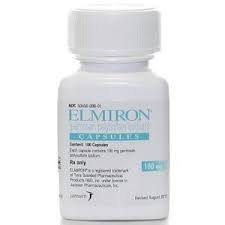Elmiron: Uses, How Its Works, Dosage, Side Effects

What is Elmiron and what is it used for?
Elmiron contains the active substance pentosan polysulfate sodium a medication used to treat adults with bladder pain syndrome, a condition of the bladder which causes pain in the pelvic area, and a frequent, urgent need to pass urine.
Bladder pain syndrome can be caused by an inflamed or irritated bladder wall or ulcer in the bladder, while at other times the bladder may look normal. The condition affects between 3 million and 8 million women and between 1 million and 4 million men in the United States.
Elmiron is used in patients with moderate to severe pain and who have small bleeds or lesions (sores) in the bladder wall. The United States Food and Drug Administration approved the drug on September 26, 1996, while the European Commission granted a marketing authorization valid throughout the European Union for Elmiron on 2 June 2017.

How does Elmiron work?
The way the active substance in Elmiron, pentosan polysulfate sodium, works is not fully understood but it passes into the urine and is thought to attach to and help repair the protective layer of mucus lining the bladder, which is deficient in patients with bladder pain syndrome. This reinforcement of the protective layer may reduce inflammation and bladder pain.
How is Elmiron used?
Elmiron is available as 100-mg capsules and can only be obtained with a prescription. The recommended dose is one capsule taken three times a day. Patients should be assessed every six months and treatment should be stopped if no improvement is seen.
Follow all directions on your prescription label and read all medication guides or instruction sheets. Use the medicine exactly as directed.
Take Elmiron with a full glass of water. Take on an empty stomach, at least 1 hour before or 2 hours after a meal.
Swallow the delayed-release capsule whole and do not crush, chew, break, or open it. Your doctor will need to check your progress every 3 months to help determine how long to treat you with Elmiron. You may also need blood tests and vision examinations to check for certain side effects. If you need surgery, tell your surgeon you currently use this medicine. You may need to stop for a short time.
What benefits of Elmiron have been shown in studies?
Because pentosan polysulfate sodium is a well-known substance, and its use in bladder pain syndrome is well established, the company for Elmiron presented data from the scientific literature. A review of 4 main studies from the literature showed that pentosan polysulfate sodium is effective at reducing symptoms, such as pain and the urge to pass urine frequently.
The studies involved a total of 454 patients with small bleeds and lesions in the bladder wall. Looking at the results of the 4 studies together, 1 in 3 (33%) patients taking pentosan polysulfate sodium showed an overall improvement in their condition compared with around 1 in 6 (16%) patients taking placebo (a dummy treatment).
What are the risks associated with Elmiron?
The most common side effects with Elmiron (which may affect up to 1 in 10 people) include headache, dizziness, and effects in the digestive systems such as diarrhea, nausea (feeling sick), abdominal (belly) pain, and bleeding from the rectum. Since Elmiron may have a weak anticoagulant effect (i.e. it may stop the blood from clotting properly), it must not be used in patients who actively bleed (but this does not include women during the menstrual cycle). For the full list of all side effects and restrictions with Elmiron, see the package leaflet.
How safe is Elmiron?
In patients with small bleeds and lesions in the bladder wall, treatment with Elmiron led to significantly more patients having an overall improvement in symptoms. No major safety concerns were identified, and the possible risk of bleeding can be minimized with appropriate precautions.
Recommendations and precautions to be followed by healthcare professionals and patients for the safe and effective use of Elmiron have been included in the summary of product characteristics and the package leaflet. However, there is an ongoing Elmiron lawsuit after people claimed they suffered vision problems that could lead to blindness, including maculopathy after using the medication.





